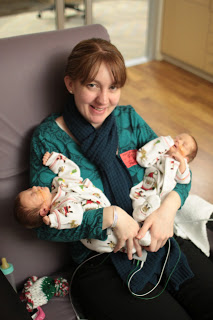Like many moms, as I sat quietly holding my pregnant belly so many nights I envisioned my baby, perfect and sound in my arms breastfeeding: the slight suckling sound, the calm face, the bright eyes looking right up at me. I had this experience with my first daughter. I breastfed her for 15 months and didn’t question a day of it.
As my 2nd and 3rd daughters were born, the evening was frantic. I was just short of 32 weeks along. I was on a magnesium drip for nearly 3 hours and contractions were just becoming more and more intense. As the nurses did a quick scan to check the girls’ positions, they found my Sophia footling breech, her feet straight down, her knees bent slightly and her umbilical cord, wrapped right under her left knee.
My placenta was low, not a previa but in a bad position to try to get both girls out safely. As the resident checked my cervix one last time, I was nearly 6 cm dilated. We couldn’t wait any longer. Labor wasn’t going to stop and if I attempted to birth the girls, it could turn deadly. The doctors moved quickly around me, got me to the OR, administered a spinal and epidural and quickly got both of my babies out. They were born within 30 minutes of being told I would need a C-section.
This was not the picture I’d imagined. This was not experience I dreamed about. My babies were preemies.
 |
| With my preemies |
Breastfeeding a preemie was an entirely new experience for me. It wasn’t natural. It wasn’t calming or beautiful. It took every ounce of my energy to not quit. The only reason I continued on was because I had a great support system and I had the knowledge ahead a time of what to expect.
No one ever wants to have to breastfeed a preemie but with a variety of different situations that can lead to this scenario, everyone should know. Maybe you can share this with a friend of a friend.
A preemie for the sake of my advice is going to be a baby with a prolonged stay in the NICU. There are perfectly healthy babies born at 35 weeks, premature yes, but breastfeeding them may not pose a challenge. There may be 38 week babies, full term who had health concerns and ended up in the NICU for several weeks postpartum. Every baby is different but certain factors remain the same.
First, you will miss that first important hour where the baby and you connect, bonding in the labor room. The baby won’t be alert like a full term baby. She won’t be plopped in your arms. Instead, depending on the severity of your delivery and birth, she’ll be whisked past you where a NICU team awaits. You won’t hear her first cry like you imagine from the movies. You will hear tiny squeaks. You’ll see a bluish colored baby in place of a bright pink on. And your baby will be tiny.
You have to be strong. No matter how emotional you are about the birth and delivery, if you are physically able to, you need to hook up to a pump right away, within hours of delivering if possible. And you need to pump as often as your baby will be eating or fed. You will need to set alarms to wake up in the middle of the night. No, this will not be pleasant. There is nothing cute and cuddly about a breast pump. But you have to do it.
You will cry as the bottles are empty those first 20 times you pump. And you will cry over that first ounce of colostrum that finally comes out. Save every single mL that you pump. Your preemie will start by eating just 5 mL. That’s the size of an infant Tylenol dropper.
Here are a few “musts” if you want to feed your preemie, or preemies, with breast milk.
-
Be vocal with your child’s doctors. My daughters started out on IVs getting their nutrition from fats and vitamins going right into their veins. The feeding tubes were placed on day 3. I did not question this. My milk was not in yet. The girls took 6 feedings of formula before my milk came in. 6 feedings is less than one days worth. Looking back I wish I would have asked the doctors to wait.
-
Hold your baby as often as you can. Hold her while she’s eating through the feeding tube. Hold her naked down to her diaper against your bare chest. If you baby doesn’t have to be held upright, cradle her, resting her cheek on your breast or vice versa. Get her as close to your breast as often as possible. The pump will not train your brain to keep supplying milk; you must prove to your body that a baby needs to be fed.
-
Speak with a lactation consultant early and often. Make sure one is present for the first feeding. Nursing will tire your baby out. The NICU will encourage breastmilk feeding but not always breastfeeding itself. Your baby doesn’t have to prove that she can breastfeed to leave the NICU but she does have to prove that she can efficiently bottle feed to leave the NICU. The experience with a preemie goes against everything you’ve ever been taught about feeding on demand, nipple confusion, bottle feeding, etc. These all become obstacles for you later on.
-
Once you get home, you need to watch for very important signs. Is your baby content? Is your baby wetting and dirtying enough diapers? Does your baby have a normal skin color? You will have frequent weight checks with your pediatrician. Your child will not be on the normal growth charts from birth if premature. Your pediatrician will likely want to “catch your child up” as soon as possible. This CAN be done by breastfeeding but only if your child catches on. Some preemies simply don’t learn the latch correctly or by the time the preemie is able to latch correctly, the mother’s supply has dwindled. These are the cases where supplementing may become necessary. Follow your gut when it comes to supplementing as long as your child is not in severe weight gaining danger.
-
Do not starve your child. Breastfeeding is best. We all know that. But this is a time where no one will judge you. Breastfeeding is only best if your child is remaining healthy while doing it. Making your child sick because she’s not nursing efficiently and not providing her with something in place of breastmilk simply because breast is best is not best!
It is important to keep in mind that I say these things not to scare anyone. Breastfeeding any child is the most amazing, rewarding experience there is. I say these things to prepare you, especially if you are faced with the extra challenge of a premature birth.
More than anything, make sure you have support, whether it is other NICU families, LLL, your doctor’s office, etc. make sure you have a team of people who know the ins and outs of breastfeeding preemies. Someone who knows how to breastfeed a full time baby may be helpful if you’ve never breastfed before but make sure it’s not someone who will make you feel guilty, even if not purposely, if breastfeeding ends up not working.
I am happy to say that I am still breastfeeding my preemies. There are two of them which poses its own extra obstacle. They also had both lip and tongue ties which were not discovered until just recently, another obstacle. I pump after every feeding. They get bottles of pumped breastmilk with some formula after every nursing. But they are still breastfeeding. Something is better than nothing when it comes to a preemie!
Let’s connect on social media too:
Mumbling Mommy on Facebook
Mumbling Mommy on Twitter
Mumbling Mommy on Pinterest
Category: BabiesTags: advice









